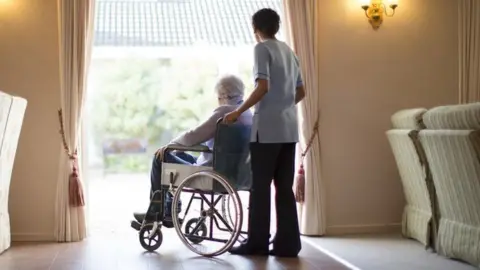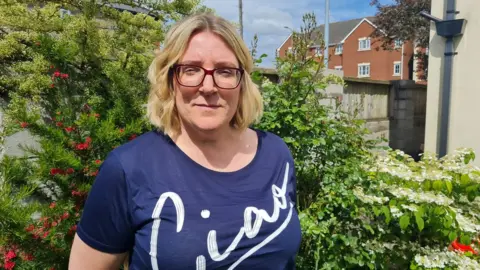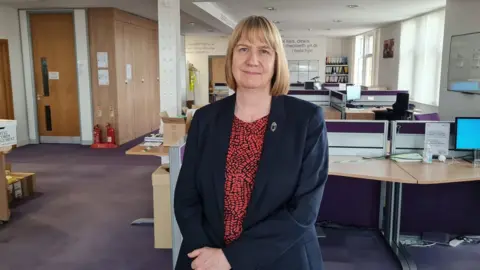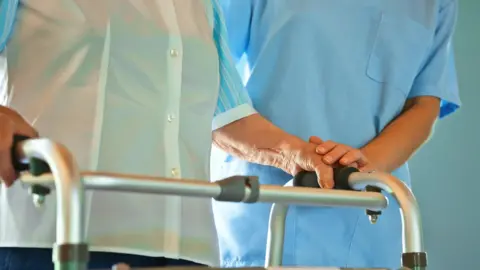Care homes: Extra fees for appointments and garden access criticised
 Getty Images
Getty ImagesCare home providers have been criticised for charging top up fees to residents for taking them to medical appointments.
The Older People's Commissioner Helena Herklots said providers should be open and honest about extra fees and social care should be made free.
Sue Simms, whose dad is in a care home, said: "It feels mean and underhanded."
The Welsh government said care homes were legally required to set out any extra charges.
Ms Simms, from Cardiff, cares for her father 78-year-old Peter Faint.
Mr Faint, who was a research and development scientist, requires full-time nursing care as he has Parkinson's Disease, vascular dementia and multiple sclerosis.
Ms Simms, a nurse, said she was "astonished and furious" when his care home told her she would have to start paying £18 an hour for every hospital appointment that she could not take her father to.
"I know from my background in A&E that if dad needed an ambulance, you could have a number of hours outside hospital, then 10 or 12 hours inside with an overnight wait for transport home.
"You could come away with a bill of hundreds of pounds," she said.

Ms Simms said she always tried to take her father to appointments but she worried about other people who may not be able to do the same for their relatives.
"We all think that everybody's got somebody but there are a lot of people who don't have anyone," she said.
"A lot of people don't have children and only an elderly spouse at home. A lot of people can't afford it. It feels mean and underhanded."
Ms Simms, who is an only child, has reduced her working hours in order to care for both her mother and father.
She said she had no idea about the top-up fees when her father moved into the home more than six months ago.
"It's another unnecessary pressure. Am I going to get a call saying my dad has an appointment and I have to juggle work? It's a pressure on my mum too and she's not well," she said.
'Extreme end'
A spokesperson for the home where her dad lives, said: "We do charge an escort fee for hospital appointments as standard at our home.
"We ask for the fee because when a carer is needed to accompany a resident, it means they are away from the home and the other residents under their care. In some cases, we will need to ensure an extra team member is on shift to cover their duties.
"In Sue's case, we apologise that the escort fees were not communicated to her and her family."
The care home added these fees were paused during the height of the pandemic and when charges restarted this should have been clearly communicated to everyone.
The Older People's Commissioner for Wales, Helena Herklots, said that it was not always clear how much extra people might have to pay. She added that some of the examples they had heard were "extraordinary".

"We've heard of one example where someone was being charged to get access to go into the garden. That's at the extreme end," she said.
She said the worry about extra costs was causing families and older people "a lot of stress".
"It's affecting their mental health, it's making them anxious and worried because they're not sure they can afford these additional costs," she added.
She has called on the Welsh government to reform social care funding to make it free at the point of need as soon as possible.
The Welsh government said it was committed to creating a National Care Service.
Chief executive of Care Forum Wales, Mary Wimbury, explained that the financial situation for care homes was "really challenging".
She said that care home fees were not increasing in line with increased costs of food, heating and staffing.
"We've got to have an honest conversation across Wales about how much care costs, how much we're prepared to pay, what we want in terms of standards, in terms of things like staff ratios," said Ms Wimbury.
She added that accompanying someone for a long hospital visit meant backfill staff would be needed in the home which would cost providers.
 Getty Images
Getty Images"There's either got to be an additional charge or it's got to be part of the general fee," she added.
The Welsh government said it expected care home providers to be clear and upfront about the fees they charge.
"They are required by law to set out this information in their written guide for the service as well as an individual's service agreement," it said.
"Creating a National Care Service, that is free at the point of need, is a commitment in the Co-operation Agreement between the Welsh Government and Plaid Cymru and we will be setting up an expert group to support this shared ambition."
The Welsh Local Government Association, which represents councils, said social care services needed "significant and sustainable" long term investments to make permanent improvements.
"The current cost of living crisis will only further exacerbate some of the current pressures, with social care facing a funding gap for current services, increasing each year due to inflation and other costs.
"This is without considering the immediate need to address unmet and under met need on these overburdened systems.
"Without adequate funding, some councils will face a battle to balance budgets, worsening existing pressures and running the serious risk of impacts on the ability to deliver timely and quality care to those who draw on it."

- THE DAY I MET THE QUEEN: Stories across Wales from people who have met The Queen
- STILL SINGING: Dunvant Male Choir and its enduring appeal

